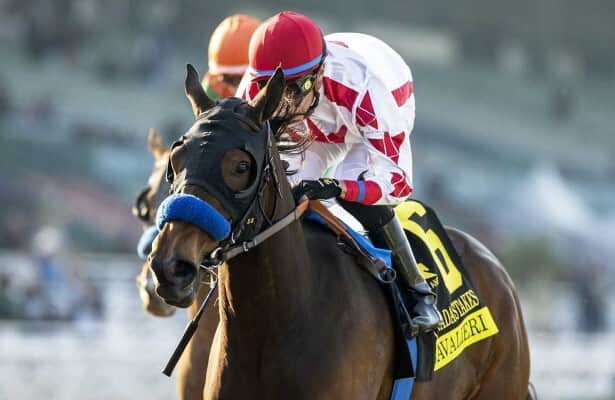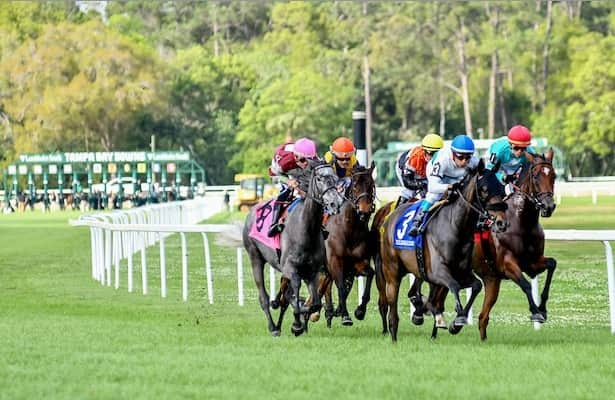Finance fears overshadow racing as BHA’s chief executive search goes on

Brant Dunshea, the British Horseracing Authority’s chief regulatory officer, will take over as the Authority’s “acting” chief executive from 1 January as the search for a permanent replacement for Julie Harrington, the CEO since January 2021, continues, the sport’s governing body said on Tuesday.
Dunshea has been closely associated with many of the sport’s key issues and initiatives since joining the authority in March 2015, including a wide-ranging review of Cheltenham’s Festival meeting in 2018, when six horses suffered fatal injuries, and regular attempts to tighten the rules around the use of the whip.
The BHA said as it announced Dunshea’s new role on Tuesday that the search for Harrington’s permanent successor has been delayed to allow the recently appointed new chair of the Authority, Lord Allen of Kensington, who will take over from Joe Saumarez Smith in May, to play a role in the recruitment process.
That makes sense, but at the same time, the hunt for a new CEO is already six months old and the list of both immediate and longer-term concerns that the incoming chief executive will need to address is, if anything, even more unsettling than it was back in June.
Bookies pay a percentage of their profits on racing bets back to the sport via a mechanism known as the Levy, and the possibility of a reform to that system, to deliver a much-needed boost to one of the sport’s main income streams, seems as distant as ever, at the same time as the latest official industry statistics from the Gambling Commission, published last week, show a continuing and worrying decline in betting turnover on the sport. That decline – in figures which go up to the end of March 2024 – is a particular concern when set against the slow but steady introduction of the “affordability checks” for punters that were part of the previous governments plans to reform gambling regulation.
There was little – well, no – concrete progress on the subject to report at a media briefing arranged by the British Horseracing Authority on Tuesday.
A voluntary agreement between racing and betting operators seemed imminent in May before Rishi Sunak’s unexpected decision to call an election put everything on hold and the gambling side has since been reluctant to re-engage as they wait to see how the new government’s regulatory regime around gambling takes shape.
There were, however, a few mildly positive noises, with Greg Swift, the BHA’s director of communications, reporting that “senior representatives from the BHA will be meeting senior representatives of the Betting and Gaming Council next week to resume those conversations”, seemingly at the behest of Baroness Twycross, the gambling minister.
The talks will resume, though, following the government’s decision to press ahead with the last government’s plans for a £100m-a-year levy on the gambling industry, to fund prevention and treatment of gambling-related harm is unlikely to speed up their return to negotiations. The bookmakers, as a result, may well suggest that the landscape has changed, times are harder, and now is not the time to give up even a tiny extra slice of their turnover to satisfy racing’s demands for extra cash.
In a more general sense, meanwhile, there is little sign of any willingness in government to move away from its predecessors reluctance to separate betting in general, and betting on racing in particular, from the significantly more dangerous online slot and gaming products that have done so much to sour the general public’s view of gambling in the first place.
Stalled negotiations on Levy reform against a background of declining betting turnover is a poor starting hand to deal to any incoming CEO. The impending arrival of the affordability checks proposed in the last government’s white paper on reform to gambling legislation is a further headache to add to the mix, along with the fact that the much-heralded arrival of Premier Racing at the start of this year has also done little – as yet- to change the metrics or the mood.
It is important to separate the imminent checks – which are intended to be “frictionless” in the vast majority of cases – from the bookmaker-instigated and much more intrusive checks that have been causing problems for punters for the last couple of years. We have no clarity at all about the criteria that individual firms are using to decide on which punters to check, and the fact that revenues from online slots and casino games remain healthy is anecdotal evidence, at least, that racing and betting business has been subjected to undue attention.
“The key number on betting turnover is a decline of £1.5bn in two years,” Swift said on Tuesday.
“I think it’s worth reminding people that when the white paper was published and we conducted our own independent analysis of the potential impact [of the new checks], it was significantly in excess of the estimates that the government made. Our view was that it was potentially a £50m hit, or the equivalent of one in seven jobs in the sport lost.
“The result of phase one of the [Gambling Commission’s] pilot tests [of the check] should be received earlyish in the new year, and we know that phase two is already underway as well. Those findings must be independently reviewed and they must be subject to really rigorous independent evaluation to fully understand the potential implications of these checks.”
Quick Guide
Greg Wood’s Wednesday tips
Show
Lingfield: 11.20 Mumayaz 11.50 Blue Secret 12.20 Texas Starlight 12.50 Blast The Dream 1.20 Countess Candy (nap) 1.50 Smart Hero 2.25 Poetic Jack 2.55 Fravanco 3.25 Overnight Oats.
Ludlow: 12.28 Galway Reel 12.58 Land Afar 1.30 Jolyjump 2.03 Brendas Asking (nb) 2.35 Dreaming Blue 3.10 Phantom Getaway 3.42 Service Minimum.
Haydock: 12.40 East Street 1.10 White Rhino 1.40 Grand Geste 2.15 Royal Infantry 2.45 Good Boy Bobby 3.18 Thereisnodoubt.
Kempton: 4.10 Thaisa 4.40 Crestofdistinction 5.10 Morte Point 5.40 Masubi 6.10 Kurakka 6.40 Marchetti 7.10 Popmaster 7.40 Silver Nightfall 8.10 Brunel Charm.
Several members of the all-party parliamentary group on gambling reform, which was a key driver of the moves to introduce the checks, are on record as saying that they have no wish to harm racing and that the checks aim to curb the harm caused by online casino games and slot machines.
The Gambling Commission, however, remains reluctant to separate betting from gaming in any meaningful way, and the attempt to persuade it to think again is likely to be a key mission for the BHA’s next full-time CEO from day one – which does rather make you wonder why anyone would fancy the job at all.
Related
Leading Parx jockey Sanchez will serve 7-day suspension
Photo: Jason Moran / Eclipse Sportswire Jockey Mychel Sanchez will serve a seven-day suspension and pay an additional $1,750 in fines
Bill Mott talks about plans for Sovereignty, Just F Y…
Photo: Gulfstream Park / Lauren King Sovereignty, dramatic late-running winner of the Fountain of Youth (G2) March 1, is being pointed
Up-and-coming Cavalieri chases Grade 1 glory in Beholder Mile
Photo: Santa Anita / Benoit Photo Cavalieri and Alpha Bella, who finished one-two in the Grade 3 La Cañada in January at Santa Anita,
4 stakes showcase shipping stars on Tampa Bay undercard
Photo: Gonzalo Anteliz Jr. / Eclipse Sportswire The stars will shine Saturday at Tampa Bay Downs, and not just in the Grade 3 Tampa Ba











